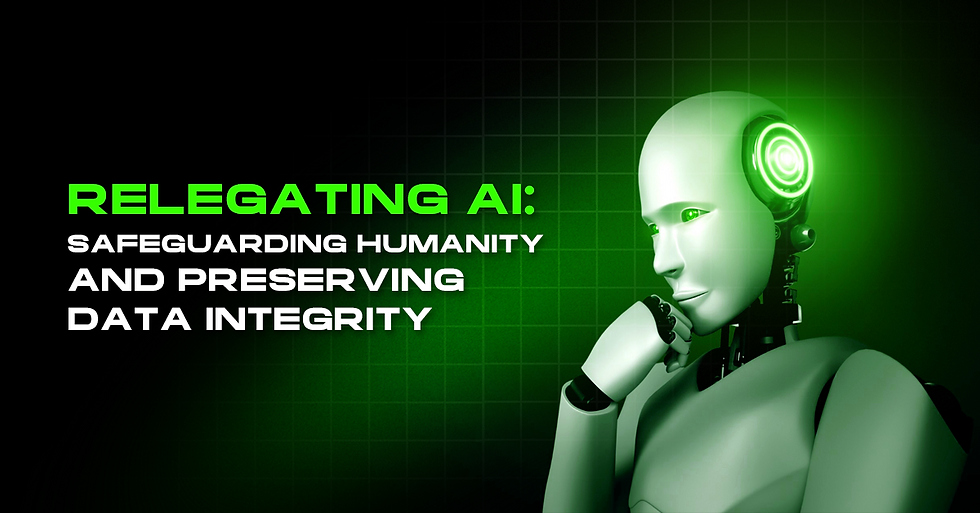Relegating AI: Safeguarding Humanity and Preserving Data Integrity
- Nitin Kumar
- May 2, 2025
- 3 min read

Artificial Intelligence (AI) technologies have spread to transform multiple areas of automation, data processing, decision-making, and problem-solving approaches. The implementation of AI has maneuvered many industries through its ability to make tailored suggestions and immediate fraud discovery systems. The growing level of public concern stems from AI advances in different areas of daily life. The public expresses extensive anxiety about job losses and artificial intelligence's control over human employees as well as deepfake technology because these topics frequently appear in science fiction novels and other media.
The portrayal in science fiction movies usually presents AI as an ultimate domination system that is capable of replacing humans entirely. This paper outlines concrete dangers that already exist in artificial intelligence while providing specific methods to control associated risks. AI integration requires a focus on ethical implementation through the use of decentralized database systems together with post-quantum encryption to ensure both proper data use and secure data integrity.
Understanding The Risks Of Unchecked AI
AI-based solutions continue their rapid process integration into daily operations which forces society to face important effects analysis. People face emerging safety challenges because AI applications deliver efficiency gains but have resulted in lowered expenses.
(Vishal Garg, Artificial Intelligence as a Second-Class Citizen: Safeguarding Humanity and Data Integrity, Volume 11 Issue 11, PageNo: 512-514, ISSN: 2349-6002, 2025)
A. Workforce Disruption
The full automation of procedural work by AI technologies leads many companies to seek fewer staff members for customer support as well as transportation and manufacturing operations. The technological changes pose a serious risk to economic stability for large populations of people.
B. Threats to Personal Identity
The advancements in artificial intelligence have made voice cloning deepfakes and AI-generated avatars able to create effective impersonations of persons. Data security measures must be in place to prevent serious problems of fraud and misinformation alongside personal privacy breaches.
C. Autonomous Weapons and Control
Security breaches in autonomous AI-powered drones and robots by manipulation can allow these systems to transform into powerful weapons for warfare along terrorist purposes. The lack of global regulation on autonomous weapons exacerbates this risk.
D. Vulnerable Data Systems
The majority of AI applications operate by using extensive databases located in central locations. Storage methods that centralize data create a substantial risk of unauthorized entry by hackers. The feeding of compromised data to AI systems makes possible their manipulation to create dangerous results along with biased output. A decentralized database structure provides the chance to protect vital information through its implementation.
Clarifying AI’s True Nature And Limitations
AI functions as an evolutionary technology that excludes sudden disruptions of industry operations. AI represents a modern development of technologies that have persisted in machine learning and pattern recognition for several decades and data science. The operation of AI systems depends on external inputs because they produce results from processed instructions and data. The behavior of these systems depends entirely on the ethical standards and security and quality aspects of the input data they receive.
Using decentralized database systems for data storage becomes vital to achieving secure and ethical operation of AI systems. A decentralized database combination improves both AI output reliability and safeguards the system against outside data threats by securing privacy functions.
Preventing AI Malpractice Through Decentralized Database Safeguards
When employed in AI systems dangerous scenarios may emerge because of the use of tainted data or harmful orders. The incorrect information input into AI algorithms running autonomous systems may lead to unintentional harm affecting persons or their property. All AI systems require human oversight for their management despite their autonomous nature.
The potential danger that arises from AI systems demonstrates how much we failed to monitor or supervise their operation properly. A decentralized database...




Comments